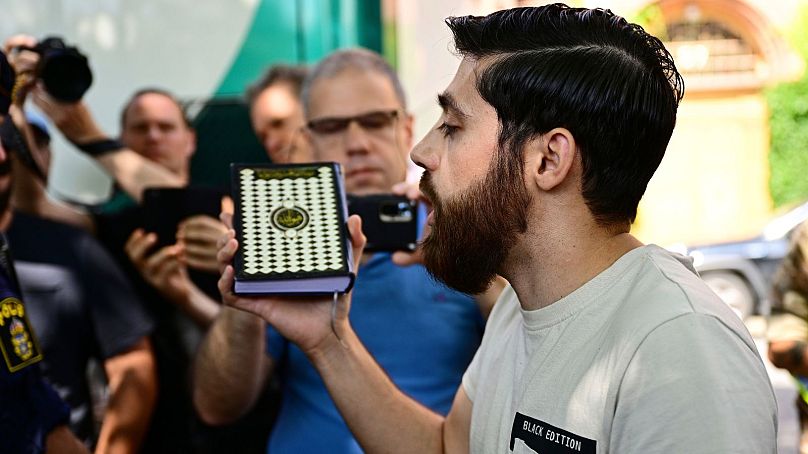The protests have sparked outrage in countries such as Iraq, Iran and Lebanon, but the country has no law against blasphemy and protections for freedom of speech.
Recent public desecrations of the Quran by a handful of anti-Islam activists in Sweden have sparked an angry reaction in Muslim countries and raised questions about why such acts are allowed.
 ADVERTISEMENT
ADVERTISEMENT
 ADVERTISEMENT
ADVERTISEMENT
In the latest incident, an Iraqi living in Sweden on Thursday stomped on and kicked Islam’s holy book in a two-man rally outside the Iraqi Embassy in Stockholm. The protest was authorised by Swedish police, who kept a handful of counter-demonstrators at a safe distance.
The same Iraqi man burned a Quran outside a Stockholm mosque last month in a similar protest that was approved by police.
Demonstrations were planned for Friday in Iran, Iraq and Lebanon against the most recent protests in Sweden. Iraqi Prime Minister Mohammed Shia al-Sudani has also ordered the expulsion of the Swedish ambassador from Iraq and the withdrawal of the Iraqi charge d’affaires from Sweden.
Here’s a look at how Swedish authorities have been dealing with the protests in their country.
Is desecrating the Quran allowed in Sweden?
There is no law in Sweden specifically prohibiting the burning or desecration of the Quran or other religious texts. Like many Western countries, Sweden doesn’t have any blasphemy laws.
Can Swedish authorities stop such acts?
Many Muslim countries have called on the Swedish government to stop protesters from burning the Quran. But in Sweden it is up to police, not the government, to decide whether to authorise demonstrations or public gatherings.
The freedom of speech is protected under the Swedish constitution. Police need to cite specific grounds to deny a permit for a demonstration or public gathering, such as risks to public safety.
Stockholm police denied two applications for Quran-burning protests in February, citing assessments from the Swedish Security Service that such acts could increase the risk of terror attacks against Sweden. But a court later overturned those decisions, saying police need to cite more concrete threats.
Can Quran-burning be considered hate speech?
Sweden’s hate speech law prohibits incitement against groups of people based on race, ethnicity, religion, sexual orientation or gender identity.
Some say burning the Quran constitutes incitement against Muslims and should be considered hate speech. Others say such acts are targeting the religion of Islam rather than practitioners, and criticism of religion must be covered by freedom of speech.
Seeking guidance from the justice system, Swedish police have filed preliminary hate crime charges against the man who burned the Quran outside a mosque in Stockholm in June and desecrated Islam’s holy book again on Thursday. It’s up to prosecutors to decide whether to formally indict him.
Are Swedish authorities singling out Muslims and the Quran?
Some Muslims in Sweden who were deeply hurt by recent Quran burnings questioned whether Swedish police would allow the desecration of holy books from other religions.
One Muslim man apparently decided to put that to the test and applied for permission to stage a protest last Saturday outside the Israeli Embassy in which he said he intended to burn the Torah and the Bible.
Though Israeli government officials and Jewish groups condemned the planned act and called on Swedish authorities to stop it, police approved the man’s request. However, once at the scene the man backed away from his plans.
How is blasphemy viewed in other parts of the world?
Blasphemy is criminalised in many countries. A Pew Research Center analysis found 79 countries and territories out of 198 studied had laws or policies on the books in 2019 that banned blasphemy, defined as “speech or actions considered to be contemptuous of God or of people or objects considered sacred.” In at least seven countries - Afghanistan, Brunei, Iran, Mauritania, Nigeria, Pakistan and Saudi Arabia - it carried a potential death sentence.











